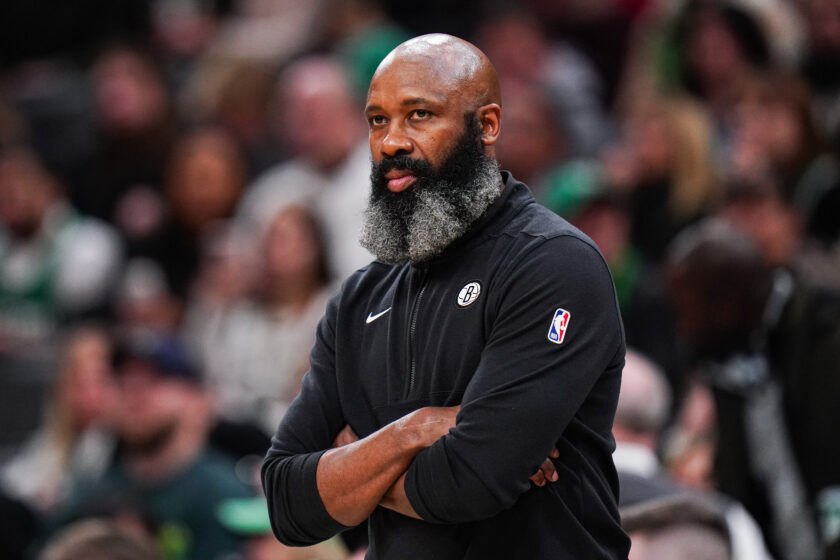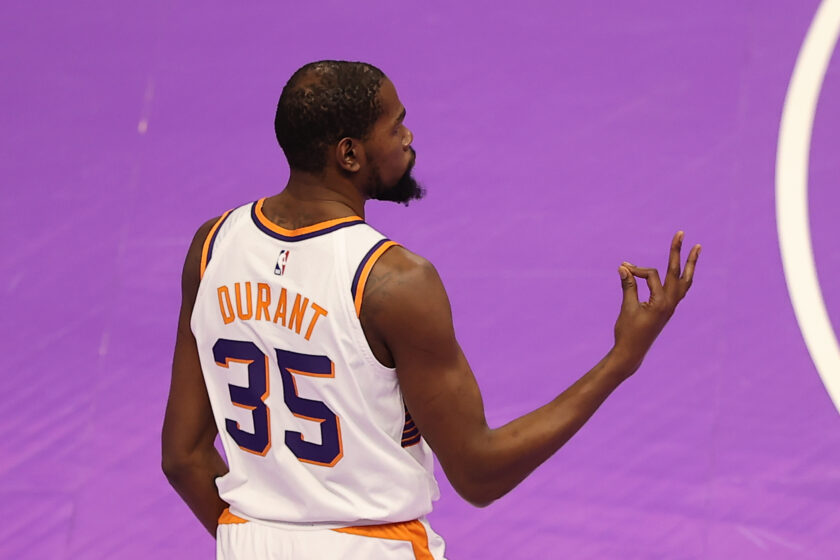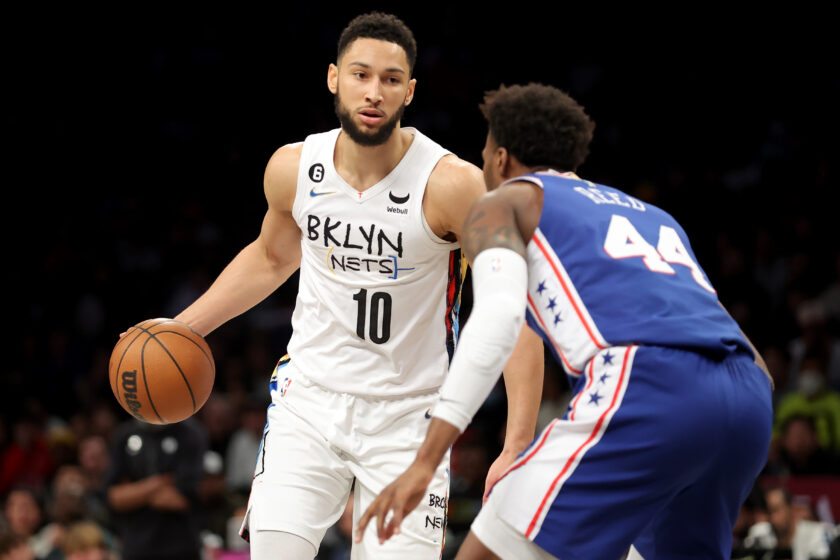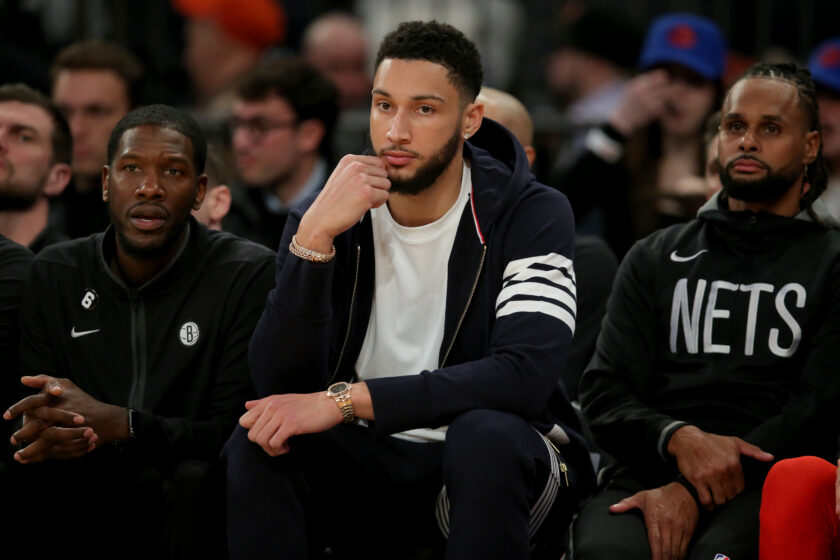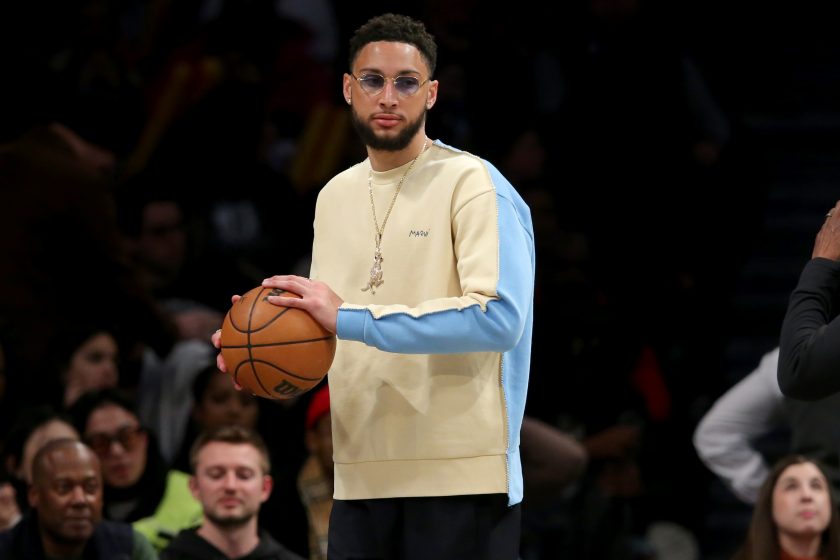This is not a joke; Jared Dudley is essential to a Brooklyn Nets series victory
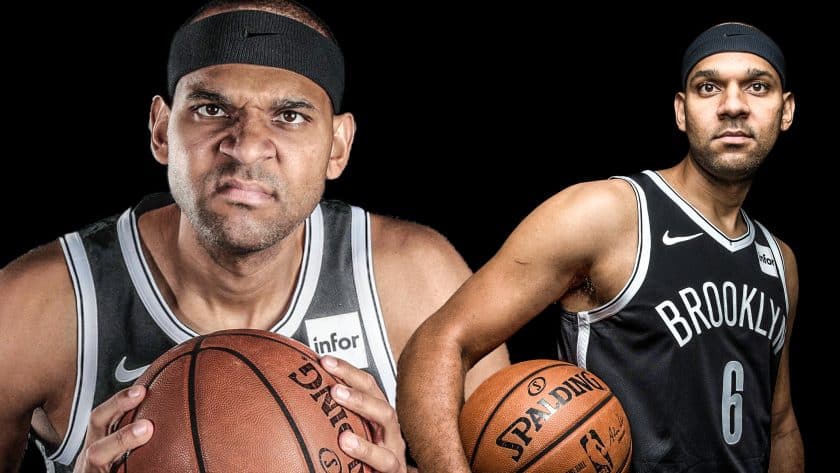
Jared Dudley has quickly risen from a locker room leader to a playoff X-factor. His Brooklyn Nets may need him back on the floor more than they would like to admit.
[sc name=”Matt Brooks Banner”]You could make the argument that Jared Dudley is more important than D’Angelo Russell to the Brooklyn Nets during the playoff series against the Philadelphia 76ers.
In principle, this is a ridiculous argument to make. I realize that. Stating that a 33-year-old journeyman who averages only 20.7 minutes per game is more essential than Brooklyn’s youthful All-Star point guard is one hell of a hot take to make.
Russell has averaged 21 points versus the 76ers through two games. He’s been one-half of Brooklyn’s dynamic backcourt that has caused mass hysteria within Philly. His shooting percentages are down to just 39 percent from the field and he’s recorded more turnovers (8) than assists (6). But still, Russell’s shooting from deep has kept Brooklyn afloat against a top-heavy Sixers team.
Jared Dudley, on the flip side, has averaged just 4 points, 0 rebounds, and 4 assists. In Game 1, Dud played 28 hard-fought minutes—eight more than his season average. The heightened load may have caused Dudley to overexert himself; JD missed Game 2 with a calf strain. In a way, his sudden injury should have come as no surprise. The aging power forward will turn 34 in July and has a 6-foot-7, 237-pound hefty frame that would make the legendarily Thicc Zion Williamson jealous.
With limitations on his physical longevity and a minuscule dent to the stat sheet, what makes Jared Dudley so important to Brooklyn?
Since day one, Jared Dudley has always been a hustler. A former ACC Player of the Year, Dudley earned the nickname “Junkyard Dog” during his years at Boston College for his fortitude when diving for loose balls and taking charges.
Drafted 22nd overall in the 2007 NBA draft, Dudley was seen as a potential glue guy. However, with limited top-speed and below-average size for his position, scouts were worried about his ability to stay in the league.
Jared Dudley has always been a highly touted defensive player. It’s his calling card. Even during his first couple seasons — when Dudley was labeled a dreaded “tweener” (too small to play power forward, but not quick enough to play small forward) — Jared was able to hang around due to his effort on the unheralded side of the floor.
With a strong defensive backbone in place, Dudley quickly proved doubters wrong and fulfilled that glue guy moniker. In just his third season, he found a way to implement himself into the Pheonix Suns’ playoff rotation. Dudley had a masterful run, averaging 7.6 points and 3.8 rebounds while shooting the three-ball at a 42.4 percent clip.
This was where the legend of “Playoff Dudley” was born. Aside from a few inconsequential first-round bounces, Dudley’s playoff form wouldn’t be able to rear its head for nearly a full decade.
That all changed this season. Playoff Dudley is back. He might be better than ever.
[sc name=”Nets Center”]Dudley entered the 2018-2019 NBA Playoffs as a projected 10th, maybe 11th, man. After starting for nearly a quarter of the season, Dudley quickly saw his minutes dwindle as the season progressed. First came the breakout of rookie Rodions Kurucs. Then DeMarre Carroll made his dramatic resurgence. As more and more of Dudley’s teammates made their marks on the season, the 33-year-old saw his role decline.
I managed to write 2,600 words in my preview of the Brooklyn Nets playoff matchup against the 76ers; none of which included the names “Jared” or “Dudley.” That’s how much of an afterthought he was coming into this series. With a shooting stroke that has long betrayed him, it seemed inconceivable that the creaky vet could stay on the floor against such a wildly athletic Sixers team.
However, the signs of a “Remember the Titans” comeback was there. In an interview with the radio station WFAN, Dudley listed a couple of sticking points for the upcoming series versus Philadelphia. The biggest being his strategy for defending Magic Johnson-like point guard, Ben Simmons.
“We will leave him wide open,” said Dudley, “until he proves in this league he can hit shots. Right now he’s not even attempting it. So we know that he’s not going to be able to do that for the most part.”
Dudley was a man of his word and quickly made an imprint on the series. The 13-year vet broke out his age-old defensive chops, picking up Simmons in transition.
“Mismatch nightmare” is a term that gets thrown around too loosely. Ben Simmons is worthy of the claim. At 6-foot-10 with the speed of a guard, Simmons is one of the league’s most frightening fast break players — next to physical freaks like Giannis Antetokounmpo and Russell Westbrook. Simmons averages 4.7 fast-break opportunities per game and scores on a very solid 61.2 percent of his transition field goal attempts, per NBA.com.
Dudley was largely unphased by Simmons’ freak athleticism. Having read the scouting report, JD forced Philly’s 22-year-old point guard to think on the fly.

In the play above, notice how Dudley sags off Simmons for the entirety of the possession. Against any normal player, this would spell death. Against Simmons, it’s the perfect strategy.
Dudley backtracks all the way to the restricted area, encouraging Simmons to shoot the ball. Simmons, whose offense game extends to only two-feet beyond the basket, is clearly thrown off by the strategy. With ample space inside the paint, Simmons should attempt a one-handed push shot. However, this type of shot is not in Simmons’ repertoire considering he’s only attempted 31 total driving floaters during the regular season.
Simmons instead responds to Dudley’s unique defensive approach by panicking. He throws an ill-advised pass to a well-covered Tobias Harris. Easy turnover for the Nets.
Talk about the perfect defense. Dudley was balanced, had his hands up the entire possession, and avoided fouling the superiorly athletic Ben Simmons.
Dudley wasn’t finished with performing magic against Philly’s superstar of the future. Later in the second quarter, Dudley again picked him up in transition.

Once again, he frustrated Simmons into a poor decision. Dudley’s footwork is pristine here, staying stride for stride with Simmons before pulling the chair out from under him. Simmons, who had been leaning on Dudley to get space, loses his balance and tosses up a glass-shattering miss.
To get an idea of just how instrumental Dudley was during Game 1, take a look at these matchup statistics (courtesy of NBC Sports’ Tom Haberstroh):
Guarded by Dudley in Game 1
Ben Simmons 2 pts on 22 possessions
Mike Scott 0 pts on 11 possessions
Boban Marjanovic 0 pts on 7 poss
Joel Embiid 0 pts on 3 possTotal: 2 pts on 43 possessions
Tough loss for Brooklyn https://t.co/RvsONKpyXA
— Mr. Statistician Face Man (@tomhaberstroh) April 15, 2019
Dudley put the exclamation point on Brooklyn’s big upset late in the fourth. With Brooklyn up by eleven, Spencer Dinwiddie attempted a driving layup with four minutes remaining in the quarter. Din’s layup was promptly swatted away by Joel Embiid where it ended up in the hands of Ben Simmons.
Simmons knew what to do. It’s what he had done for most of his young career. He charged hard toward the opposing basket. Blowing by Nets’ defenders, the only player in his path was Jared Dudley.

Dudley was likely the last person on earth that Simmons wanted to see standing in front of the basket.
JD’s evil genius was at work. At this point, he had perfected a mind-meld on the inner workings of Philly’s cerebral point guard. While Simmons is a tremendous player in transition, he does have his warts; most namely, his 23.6 percent turnover percentage (fourth-highest in the league).
Dudley knew that Simmons wasn’t going to shoot the ball. Shooting (and missing) had earned the 22-year-old thunderous boos from the home crowd. Simmons was in a stage-five mind-fuck. All Dudley had to do was let Philly’s young guard get in his own way.
Simmons — a pass-first player — stuck to his prenatal instinct and hastily dished the ball to Jimmy Butler to avoid further embarrassment.
Dudley, knowing what was coming, picked the pass off like an All-Pro safety. JD then sprinted up the court before earning free throws. Simmons, meanwhile, was left in the dust with his pants around his ankles.
I let out a very audible “sh*t” when I saw the news run across my Twitter timeline. Two hours before the Game 2 tip-off, The Athletic’s Shams Charania broke the unfortunate news about Brooklyn’s locker room leader.
Sources: Nets forward Jared Dudley (calf) will miss tonight’s Game 2 in Philadelphia. Dudley played a critical role for Brooklyn in Game 1.
— Shams Charania (@ShamsCharania) April 15, 2019
I knew three things about Philadelphia prior to the start of Game 2: the Sixers would punch the Nets in the mouth to defend home-court, they would benefit from some home cooking from the refs, and (after seeing Mr. Charania’s tweet) Ben Simmons would have a big game.
This may seem like hindsight bias (admittedly, it probably is), but Brooklyn won Game 1 by erasing the one guy on Philly’s roster who can ensure ball movement. We have Jared Dudley to thank for that.
Simmons was a factor early in Game 2, scoring four quick points in the first two minutes, all four of which occurred in transition.

Brooklyn didn’t know what hit them. With their lead communicator nursing a calf injury, the Nets were woefully caught out of position. Notice how, in both possessions, none of Brooklyn’s defenders sagged back to counter Simmons’ drives. Simmons happily obliges, scoring on an easy drive during the first play and drawing free throws in the second.
Once Philly’s star got the ball rolling, it was over for Brooklyn. Feeling the wind in his sails, he posted up Rodions Kurucs during the next possession. Easy bucket.

(Brooklyn should be terrified of Simmons posting up, by the way. They don’t have the horses to match up.)
This provoked Simmons to activate his passing gene, which in turn helped break JJ Redick and Tobias Harris‘ shooting slumps. Not good. It also took some of the weight off of Joel Embiid’s shoulders (and injured knee). Double not good.

Most importantly, the early scoring helped Simmons buy-in defensively. This is the nature of most young players; the best way to bring about great defense is to cater to them offensively.
Feeling himself from the scouring bout, Simmons began to take the matchup with fellow All-Star point guard D’Angelo Russell personally. After scoring 16 points through two quarters, Russell was held to zero points in the second half. This can be attributed to Simmons’ nightmarish coverage. Simmons used his size to his advantage and engulfed Russell on nearly every possession.

As you can see, not an inch of airspace. Poor D’Angelo Russell.
In Games 1 and 2, we saw both sides of Ben Simmons; who, for better or for worse, acts primarily off of confidence. In Game 1, we saw an offensively limited 22-year-old who was overthinking the game. In Game 2, we saw an all-around menace. A guy who is, arguably, Philadelphia’s most important player. The MVP in Philadelphia’s Game 2 victory.
Not much changed about Brooklyn’s defensive system from Game 1 to Game 2. For the most part, the minutes distribution was even, the rotations were similar, and the defensive schematics remained mostly unchanged.
The only key difference was the absence of Jared Dudley.
I realize how ridiculous it sounds to call Jared Dudley — an out of shape role player — the Kryptonite to a top-25 player in the world. But the tape from Game 1 bears the truth. Jared Dudley’s dropback coverage completely erased Ben Simmons’ primary source of scoring: transition buckets. Without his early scoring, Simmons imploded and put together one of the worst playoff performances of the weekend.
This is why I believe that Jared Dudley might be the most important player in the series. While Brooklyn’s stars (Caris LeVert, D’Angelo Russell, and Spencer Dinwiddie) receive attention for their scoring, they are all fairly reductive. All of them put pressure on the hoop, and if one of them has an off night, there’s another to take his place.
There is no one on Brooklyn’s roster who can replicate Dudley’s defensive IQ. He may be the only Net who can successfully shut down Ben Simmons, even if it’s just for one game. That is an accomplishment in itself. The stats will never tell the full tale for a guy like Jared Dudley. But hopefully, articles like this can.
Players like Jared Dudley are why I love the NBA playoffs. While the stars gobble up fans’ attention, it’s the role players who can swing a series.
Jared Dudley quickly rose from a clumsy fan favorite to the hero of one of the more unprecedented playoff upsets.
Stories like this are what makes the NBA postseason so enthralling. It’s three months of pure unpredictability. There’s truly nothing like it.
[sc name=”Nets Link Next” link=”https://elitesportsny.com/2019/04/16/brooklyn-nets-hit-negative-record-books-after-philadelphia-76ers-game-2-rout-highlights/” text=”Brooklyn Nets Hit The Negative Record Books After 76ers Game 2 Rout ” ]An NBA fanatic who specializes in the advanced analytics of the game. I cover the Brooklyn Nets here in the city. Follow me on Twitter for semi-witty basketball tweets. @MattBrooksNBA

